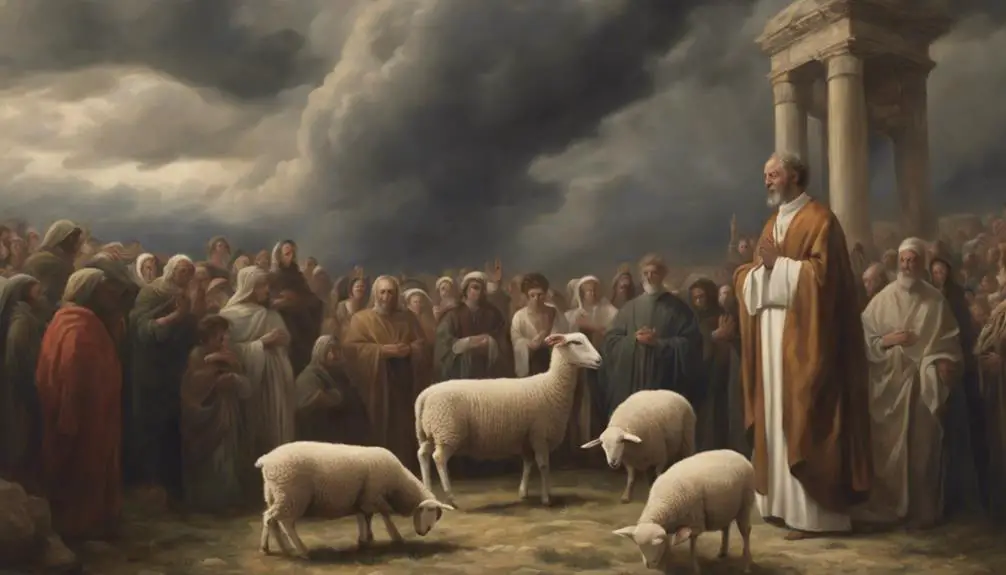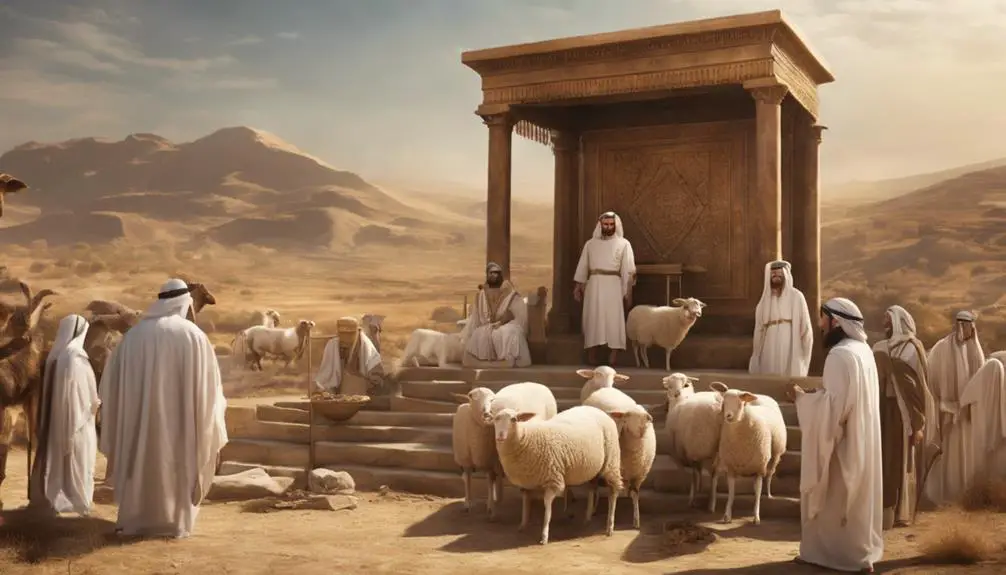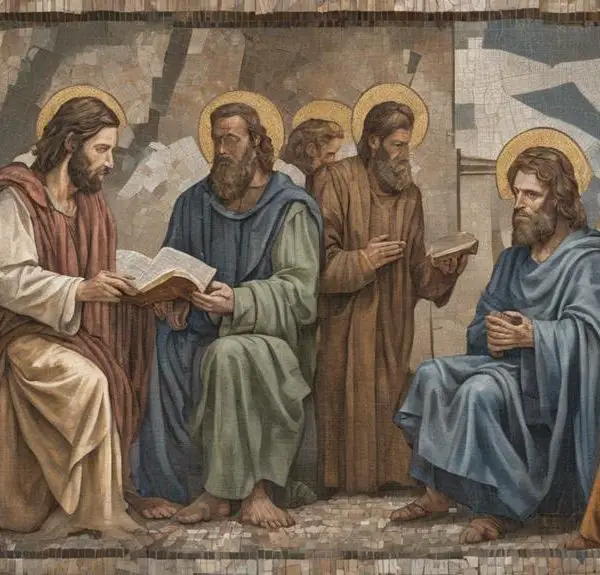Mystify yourself with the profound symbolism and historical context of blood sacrifice in the Bible; a practice central to ancient religious rituals.

Blood Sacrifice in the Bible
While it's easy to dismiss the concept of blood sacrifice in the Bible as archaic or barbaric, you might find a deeper exploration reveals a rich symbolical significance.
You're not being asked to accept or participate in such practices, but to appreciate the historical and cultural context that surrounded them.
Don't you wonder why something seemingly so gruesome was so integral to ancient religious rituals?
A closer look might just offer surprising insights into the human quest for atonement and redemption.
Key Takeaways
- Biblical blood sacrifices were complex rituals central to Israelite's social and religious life, symbolizing purification and atonement.
- Blood, perceived as life force, played a symbolic role in biblical events and covenants, representing life, protection, and agreement.
- The interpretation of these sacrifices has stirred debates among scholars, with controversies rooted in metaphysical implications and ethical considerations.
- Modern Christianity has transitioned from literal blood sacrifices to symbolic expressions of faith, with Christ's sacrifice and the Eucharist as prime examples.
Understanding Biblical Blood Sacrifices

Diving into the realm of biblical blood sacrifices, you'll find a complex system of rituals deeply intertwined with the spiritual beliefs and practices of ancient Israelites. These sacrificial rituals weren't merely acts of religious devotion but also served as a tangible expression of their commitment to Yahweh, the God of Israel.
A close analysis of biblical interpretations reveals an intricate pattern in these sacrifices. The act of shedding blood held profound significance, typically symbolising purification or atonement. The ritualistic killing of an animal, usually a lamb or a goat, wasn't an act of senseless violence but a complex spiritual transaction. The blood of the innocent creature was seen as a potent force that could cleanse the people's sins and reestablish their relationship with God.
In the book of Leviticus, you'll find detailed instructions on how to perform these sacrifices, including the types of animals to be used, the manner of their killing, and the disposal of their blood. This specificity underscores the importance placed on these rituals, demonstrating how central they were to the Israelite's religious and social life. Understanding these practices offers a glimpse into the complexity and depth of ancient Israelite spirituality.
Historical Context of Blood Sacrifice

To fully grasp the significance of blood sacrifice in the Bible, it's crucial to understand the historical context in which these rituals took place. In ancient times, blood was considered the life force, and its offering was seen as the ultimate act of devotion, a means to appease deities and ensure prosperity.
These practices weren't exclusive to the Israelites. They were influenced by the pagan cultures surrounding them, who also performed similar rituals. This intersection of practices is a testament to the prevalent and shared belief in the sanctity of blood across different societies. Pagan influences were particularly evident in the rituals and ceremonies performed, highlighting the extent of their cultural impact.
Furthermore, the Bible's ancient rituals were deeply rooted in societal norms and beliefs of the time. They served not just religious purposes but also social ones, reinforcing community bonds and societal hierarchies. Understanding this context helps you to see blood sacrifices as more than just religious rites; they were integral, complex components of ancient societies.
Symbolic Significance of Blood

Moving beyond historical context, let's now explore the symbolic significance of blood in these ancient biblical rituals. Blood symbolism, a salient theme throughout the Bible, carries profound covenant significance.
In biblical literature, blood often symbolizes life, as it is a vital life-sustaining fluid. It's no surprise then that blood plays a critical role in biblical covenants, signifying the life-force exchanged or promised in the contract.
To illustrate, let's consider the following table:
Biblical Event |
Symbolic Significance of Blood |
|---|---|
Abel's Sacrifice (Genesis 4:4) |
Blood as a symbol of pleasing sacrifice |
Covenant with Noah (Genesis 9:4-6) |
Blood as a symbol of life |
Covenant with Abraham (Genesis 15:9-10) |
Blood as a symbol of promise |
Passover (Exodus 12:7,13) |
Blood as a symbol of protection |
Mosaic Covenant (Exodus 24:5-8) |
Blood as a symbol of agreement |
These examples underscore the symbolic potency of blood in the biblical narrative. Thus, understanding blood symbolism is key to comprehending the covenant significance of biblical blood rituals.
Interpretation and Controversies

Despite the rich symbolism embedded within biblical blood rituals, their interpretation isn't without controversies, sparking debates among scholars, theologians, and readers alike. You'll find sacrificial rituals are often the crux of these discussions, as they're steeped in historical and cultural contexts that are open to numerous interpretations.
The controversial interpretations of these rituals may stem from their metaphysical implications or ethical considerations. For instance, some scholars argue that these rituals can be seen as symbolic acts of atonement, while others contest they represent a form of divine appeasement or even a form of divine wrath.
Moreover, controversies also arise when interpreting the intent behind these rituals. Some argue they were meant to demonstrate obedience and submission, while others contend it was a way to establish a covenantal relationship with the divine.
Furthermore, are these sacrificial rituals to be taken literally or metaphorically? This question creates another layer of controversy, as it could fundamentally alter one's understanding of biblical narratives.
Blood Sacrifice in Modern-Day Christianity

While the historical perspective on blood sacrifice offers intriguing insights, you might find it fascinating how these practices are understood and applied in the context of modern-day Christianity. Christianity's stance has largely moved away from literal blood sacrifice, interpreting it metaphorically through the lens of Christ's sacrifice.
Modern rituals in Christianity, such as the Eucharist, have been interpreted as symbolic representations of the biblical blood sacrifice. Here's a table showing the evolution:
Historical Blood Sacrifice |
Modern Christian Interpretation |
|---|---|
Sacrifice of animals |
Christ's sacrifice |
Blood as a cleansing force |
Blood of Christ as spiritual cleansing |
Physical act |
Symbolic act in modern rituals |
Direct appeasement of God |
Expression of faith and remembrance |
This comparison highlights how Christianity has transformed the understanding of blood sacrifice from a physical act to a symbolic one. While the symbolic act might seem less tangible, it's no less significant in the faith and practices of modern Christians. The blood sacrifice, in its new form, serves as a constant reminder of Christ's sacrifice and its profound implications for Christian faith.
Frequently Asked Questions
How Has the Concept of Blood Sacrifice Influenced Other Religious Practices Outside Christianity?"
You'll find that the concept of blood sacrifice has notably influenced other religious practices outside Christianity.
Various modern interpretations and cultural adaptations of this sacrificial act can be observed in different religions around the world.
It's often seen as a symbol of devotion and commitment. However, it's important to note that the meaning and significance can greatly vary depending on the specific religious context.
Are There Any Anthropological or Sociological Theories Related to the Practice of Blood Sacrifice in the Bible?"
Yes, there are several theories you might consider. Some anthropologists suggest the symbolic significance of blood sacrifice may reflect societal values or hierarchies. The ritualistic context could embody group solidarity or social control.
Sociologists might argue such practices function as symbols to reinforce societal norms or religious beliefs. They often explore how these practices influence social structures, roles, or relationships.
It's a rich field of study with many different perspectives.
What Is the Psychological Impact of the Concept of Blood Sacrifice on Believers?"
The concept of sacrificial symbolism can deeply affect your psychological resilience. It can create a sense of obligation, guilt, or fear, disrupting your mental peace.
Alternatively, it may strengthen your resolve, as you view sacrifices as necessary for greater goods. Remember, these impacts vary significantly based on personal beliefs, cultural context, and individual interpretations.
Understanding this concept's psychological implications can help you navigate its potential effects on your emotional wellbeing.
How Has the Depiction of Blood Sacrifice in Media Affected Its Perception?"
You've probably noticed that media misrepresentation often distorts sacrificial symbolism, impacting how you perceive it. Movies, books, and TV shows can sensationalize these rituals, making them seem more violent or frightening than they truly are.
This skewed depiction can affect your understanding and interpretation, possibly leading to misconceptions or fear. It's important to differentiate between these dramatized portrayals and the actual symbolic meanings behind them.
What Are the Ethical Implications of Blood Sacrifice in Biblical Times?"
You're looking into the ethical implications of sacrificial symbolism and the moral dilemmas it posed in ancient times.
It's crucial to consider how societal norms and values differed back then. Sacrifices were often seen as necessary acts of devotion, even if they seem ethically challenging to us now.
Understanding this perspective helps to analyze these practices critically, without imposing our modern ethical standards on a vastly different historical context.
Conclusion
You've journeyed through the historical context, symbolism, and interpretation of biblical blood sacrifices. It's clear these rites hold profound significance, stirring debate and shaping modern Christianity.
Remember, though, that the shedding of blood was never about violence, but rather about atonement. As you continue your exploration of the Bible, keep this complex understanding of blood sacrifice in mind, for it forms a crucial part of the faith's intricate tapestry.



Sign up